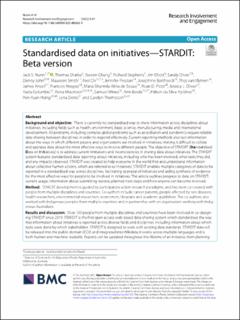| dc.description.abstract | Background and objective
There is currently no standardised way to share information across disciplines about initiatives, including fields such as health, environment, basic science, manufacturing, media and international development. All problems, including complex global problems such as air pollution and pandemics require reliable data sharing between disciplines in order to respond effectively. Current reporting methods also lack information about the ways in which different people and organisations are involved in initiatives, making it difficult to collate and appraise data about the most effective ways to involve different people. The objective of STARDIT (Standardised Data on Initiatives) is to address current limitations and inconsistencies in sharing data about initiatives. The STARDIT system features standardised data reporting about initiatives, including who has been involved, what tasks they did, and any impacts observed. STARDIT was created to help everyone in the world find and understand information about collective human actions, which are referred to as ‘initiatives’. STARDIT enables multiple categories of data to be reported in a standardised way across disciplines, facilitating appraisal of initiatives and aiding synthesis of evidence for the most effective ways for people to be involved in initiatives. This article outlines progress to date on STARDIT; current usage; information about submitting reports; planned next steps and how anyone can become involved.
Method
STARDIT development is guided by participatory action research paradigms, and has been co-created with people from multiple disciplines and countries. Co-authors include cancer patients, people affected by rare diseases, health researchers, environmental researchers, economists, librarians and academic publishers. The co-authors also worked with Indigenous peoples from multiple countries and in partnership with an organisation working with Indigenous Australians.
Results and discussion
Over 100 people from multiple disciplines and countries have been involved in co-designing STARDIT since 2019. STARDIT is the first open access web-based data-sharing system which standardises the way that information about initiatives is reported across diverse fields and disciplines, including information about which tasks were done by which stakeholders. STARDIT is designed to work with existing data standards. STARDIT data will be released into the public domain (CC0) and integrated into Wikidata; it works across multiple languages and is both human and machine readable. Reports can be updated throughout the lifetime of an initiative, from planning to evaluation, allowing anyone to be involved in reporting impacts and outcomes. STARDIT is the first system that enables sharing of standardised data about initiatives across disciplines. A working Beta version was publicly released in February 2021 (ScienceforAll.World/STARDIT). Subsequently, STARDIT reports have been created for peer-reviewed research in multiple journals and multiple research projects, demonstrating the usability. In addition, organisations including Cochrane and Australian Genomics have created prospective reports outlining planned initiatives.
Conclusions
STARDIT can help create high-quality standardised information on initiatives trying to solve complex multidisciplinary global problems. | en_US |

